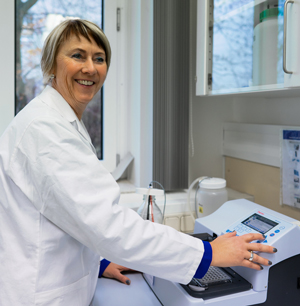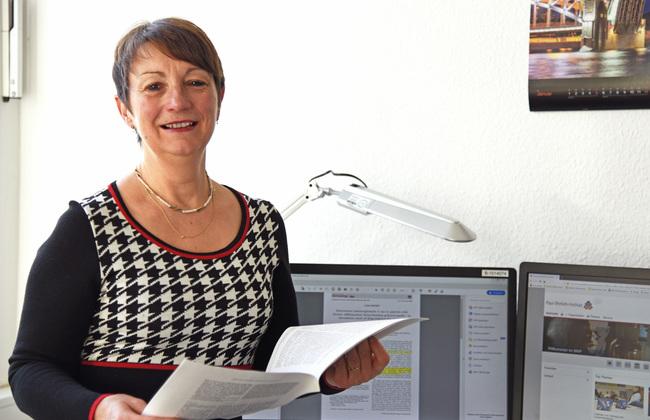What made you start a job at the Paul-Ehrlich-Institut?

After my A-levels, I was looking for a dual education scheme with a focus on natural sciences and good prospects for the future. A vocational training at the Paul-Ehrlich-Institut, for which a new building was constructed at that time, met all of these criteria for me. Thus, from 1984 to 1987, I completed a dual training course as a biology lab specialist, a training scheme offered by the Paul-Ehrlich-Institut in co-operation with Hoechst AG (now Sanofi Pasteur), which I was able to complete in a shorter period of time than regularly required. And after I was given a permanent employment contract, an innovative task was waiting for me, both safe and paid in accordance with a collective bargaining contract. Thanks to my decision for the Paul-Ehrlich-Institut, I also took on a meaningful job that was important for society. Even in the days when the Institute still had its site in Frankfurt, it already enjoyed a very good reputation in our society. For me, it was also important to know that staff members were able to become involved in the staff representative council of the Institute. The possibility of being able to work very flexibly in terms of time was also particularly positive for me. The offer of different working time models convinced me to work with the Paul-Ehrlich-Institut.
What in particular do you like about your work at Paul-Ehrlich-Institut?
Even after many years at the Paul-Ehrlich-Institut, I still like my field of activity very much. I was able to develop myself constantly, here. I have been given new focuses and challenges, which can also be combined well with my family tasks. I enjoy working independently in the lab and in the team. I really appreciate planning and carrying out experiments on my own responsibility, but also being able to organise my daily routine independently. My colleagues are very understanding, and supervisors are always open to problems and questions. For me, this means high appreciation and it encourages a good working atmosphere. I work part-time in three completely different and demanding work areas. That makes my work extremely appealing.
How can your tasks be imagined?
I work in the Product Testing Section of the Infectology Division. Among other things, our tasks include European and national marketing authorisations and viral vaccines such as vaccines against HPV or rotavirus. The practical part of my work involves experimental testing of vaccines for batch release. This means preparation and follow-up of the assays with subsequent analysis and documentation as well as developing and implementing new test procedures.
Another focus of my work is preparing batch notifications and certificates for the pharmaceutical manufacturers and the documentation. Besides, I’m in charge of organising and monitoring the testing media. This means that I check the temperature and the functionality of the equipment and am responsible for the maintenance of the databases. In our sphere of responsibility, we strictly adhere to predetermined quality guidelines. We are thus required to work with great care and accurately. In my sphere of responsbility, I can draw on several years of experience. Therefore, I also take charge of trainings and organising the appropriate training plans. Besides, I'm involved in the annual reviews of my section.
Supervising trainees and interns is another task I perform. I’m very happy to be able to share my knowledge and work with our junior colleagues. Through medical progress and developments in research, my working areas constantly change, and there are always new exciting tasks and challenges.

What did your professional life look like before you joined the Paul-Ehrlich-Institut?
Before working at the Paul-Ehrlich-Institut, I was able to gain extensive medical and later on regulatory experience. For a long time, I worked as a specialist medical doctor for anaesthetics, intensive care, analgesics and the emergency medicine in various maximum care hospitals and university hospitals. After that, at first, I worked at the Clinical Research Organisation (CRO), where I had a management position in the field of medicines safety working on behalf of various pharmaceutical companies. As project manager, I was also responsible for the economic success of my projects.
What made you decide to change to Paul-Ehrlich-Institut?
I was curious. As medical doctor, I had gained experience in a hospital, then gained insights into the pharmaceutical industry, and finally wanted to know how a senior authority reached their important evaluations and decisions. During my work as a clinical assessor at the Paul-Ehrlich-Institut, I can optimally combine my medical and regulatory experience. Here, I can actively contribute to making medicinal products even safer, both at European and national level. In this context, my practical experience as specialised doctor really provides me with the necessary basis and goes a long way towards helping me with my regulatory work. I can only recommend working in a clinical setting first to gain clinical experience before changing over to regulatory affairs, since the practical experience in the clinical treatment of patients is an important prerequisite for effective and at the same time reasonable regulatory measures. Lateral entrants who want to switch from medicine to regulation are therefore very welcome at the Paul-Ehrlich-Institut and their professional input is highly valued.
Altogether, the Paul-Ehrlich-Institut is a very interesting and versatile employer for scientists in the field of the life sciences. Above all, the usually genetically manufactured so-called advanced therapy medicinal products (ATMPs) are both an exciting field of research for all those interested in biology, biotechnology, and medicines development, and a challenge for regulation. This is because developments in this area give rise to hope for new therapeutics against serious diseases such as cancers or rare genetic disorders for which no sufficient treatments are yet available. These medicinal products are granted a centralised marketing authorisation in all EU member states, so that regulatory activities in this context are planned for the whole of Europe. Since the responsibility for the marketing authorisation and monitoring of ATMPs in Germany is with the Paul-Ehrlich-Institut, my colleagues are very close to new developments in medicine.
Last but not least, I very much enjoy facing constantly new challenges, no matter whether this is in the field of work organisation, e.g. with regard to the use of new databases and other information technologies or in evaluating new modes of action of medicines and research approaches, or in organising new workflows. Such workflows are of course completely different in a clinical context as compared with a federal institute working in regulation. In my professional life up to now, I have been able to experience very differing working environments, each of which were intriguing and challenging in their own way. I don't want to miss any of them.
How can your current work at the Paul-Ehrlich-Institut be imagined?
By changing from a clinical environment to pharmaceutical safety and regulation, I have exchanged surgery, the intensive ward, and the direct work with patients against a desk job. This is definitely also versatile and challenging.
I have to tackle a great variety of tasks on a typical working day. They range from the evaluation of the reports on suspected cases of adverse effects, which require a broad medical knowledge, the assessment of the safety profiles of medicinal products, the assessment of study protocols for the testing of the medicinal products in post-marketing interventional studies to identify possible risk signals and/or long-term effects, right down to ordering measures for the safety of blood donations. It is not unusual that medical professionals or patients call us when they have questions concerning the safe use of medicines. To be able to judge the relevant safety aspects of a medicinal product, I often have to study the disease patterns and the modes of actions of the medicines very thoroughly. For this reason, most of my time is taken up by preparing the authorisation-relevant safety aspects of new ATMPs and new medicines in general during the marketing authorisation process as well as post-marketing. During these processes, I closely co-operate with colleagues of other European medicines authorities, the European Medicines Agency EMA, and the different sections of the Paul-Ehrlich-Institut.




